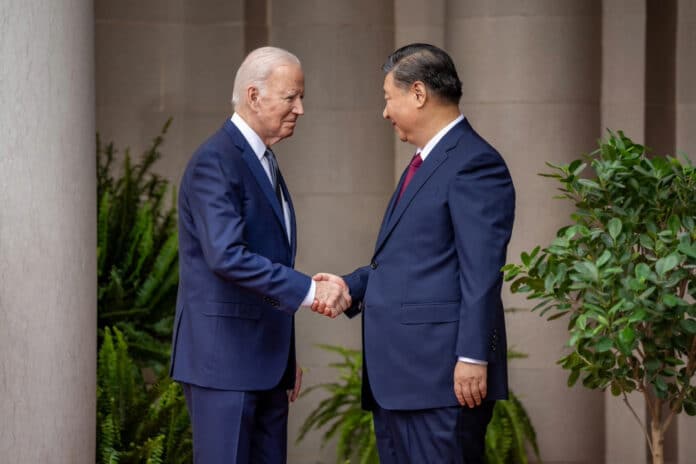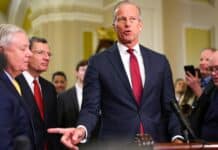
(Daily Caller News Foundation) — Democrats’ sprawling green energy agenda is making the U.S. reliant on raw materials that China dominates, putting the U.S. at a tactical and economic disadvantage, according to a report published Thursday by the Heritage Foundation.
![]()
The Biden-Harris administration has spent huge amounts of taxpayer money and regulated aggressively to transition the U.S. away from fossil fuels and instead adopt green energy as the primary power source for the economy, a strategy that plays to China’s advantage given its dominant position in the supply chains for raw minerals and materials needed to produce wind turbines, solar panels and electric vehicles (EV), the Heritage Foundation report states. The report advises policymakers to harness America’s vast domestic mineral and fossil fuel reserves to keep energy costs down at home and supply cheap energy for American allies while promptly adjusting course away from growing dependence on China.
“By leveraging mechanisms within the WTO [World Trade Organization], stealing or co-opting [intellectual property] from foreign companies, and buying out foreign companies with government guidance funds, China has succeeded in dominating the world’s supply chains in green energy products and components,” the report, which was authored by Diana Furchtgott-Roth and Miles Pollard of the Heritage Foundation, reads. “If America continues to require the use of these green energy products, it will cede economic power to China, giving China control of American energy security.”
The Inflation Reduction Act (IRA), which passed the Senate in 2022 with Vice President Kamala Harris’ tie-breaking vote, contained hundreds of billions of dollars meant to subsidize green technologies like wind, solar and EVs. However, the report warns that trying to subsidize American green technology to compete with Chinese companies that benefit from extensive Chinese state subsidies and unfair trade practices is a losing battle.
The authors urge American policymakers to “refuse to engage in an unwinnable subsidy war and repeal all green tax subsidies and credits.” Doing so will “enable a more rational choice of forms of energy and choice of vehicles and appliances” for American consumers while “[reducing] incentives to invest in green industries rather than America’s abundant hydrocarbon and power-dense nuclear industries.”
Another domestic solution the report puts forth is to more efficiently and frequently grant permits to corporations seeking to develop mines and other projects that extract critical minerals inside the U.S. Citing Bureau of Land Management (BLM) data, the report shows that both applications and approvals for new mining projects have tanked in recent years: in 2011, there were 72 such applications in the works and 32 mines approved, with those numbers declining to 14 and 6, respectively, by 2022.
The Biden-Harris administration has also killed or otherwise disrupted numerous domestic mining projects, such as Alaska’s Pebble Mine and the Twin Metals Mine in Minnesota. Those developments could ostensibly help the U.S. source critical minerals domestically and decrease reliance on Chinese supply, so the administration’s work to keep some of these key projects from becoming operational is likely counter to the national interest, the Heritage report asserts.
Meanwhile, Chinese entities controlled about 85% of the share of global battery production in 2023, dominating other nations in the production of key battery components as well, according to the report. Moreover, Chinese companies also produced two out of every three EVs made in 2023, per International Council on Clean Transportation data cited in Heritage’s report.
China is similarly dominant in terms of producing solar modules, cells and wafers as of 2021, and Chinese companies also hold about 66% of the global market for wind turbines, according to the Heritage paper.
Beyond repealing counterproductive green subsidies and freeing up domestic mining projects with streamlined permitting and deregulation, Furchtgott-Roth and Pollard also contend that the U.S. can adjust course for the better by making a deliberate effort to improve commercial relations with resource-rich nations in Africa and South America while using tariffs to “deal harshly” with China’s efforts to dominate crucial American industries, with particular focus on those Chinese firms that are thought to pose national or economic security risks.
Additionally, the two authors contend that the U.S. should use its influence at the WTO to ensure that China’s “developing nation” status is updated to reflect its actual, more advanced level of economic development. Among other advantages, “developing nation” status has helped China to undercut Western competitors with cheaper products while skirting commitments to protect and respect American intellectual property, according to the report.
“China is not forcing America to purchase its products, but America is making itself dependent on China by choosing to use federal and state regulations to require that the United States and individual states use renewable energy and electric vehicles. This reduces jobs for American workers and increases jobs for Chinese workers,” the Heritage report states. “It slows U.S. economic growth because green energy is more expensive than oil, gas, coal, and nuclear. It sacrifices American national security interests because China is not an American ally, and it is therefore unwise to depend on China for a vital section of the American economy.”
The White House did not respond immediately to a request for comment.
This article was originally published at the Daily Caller News Foundation.










